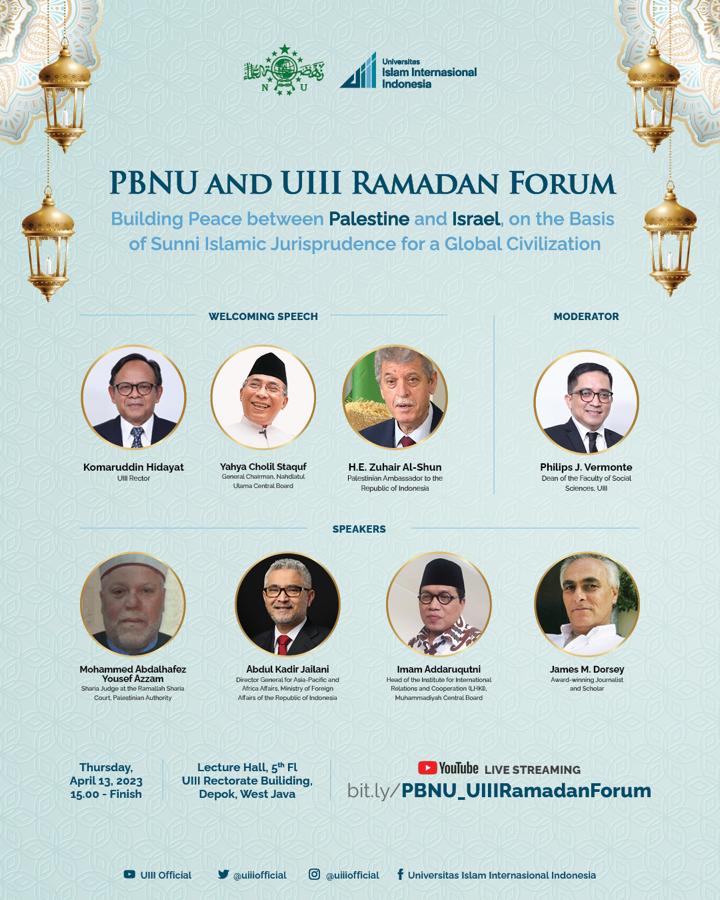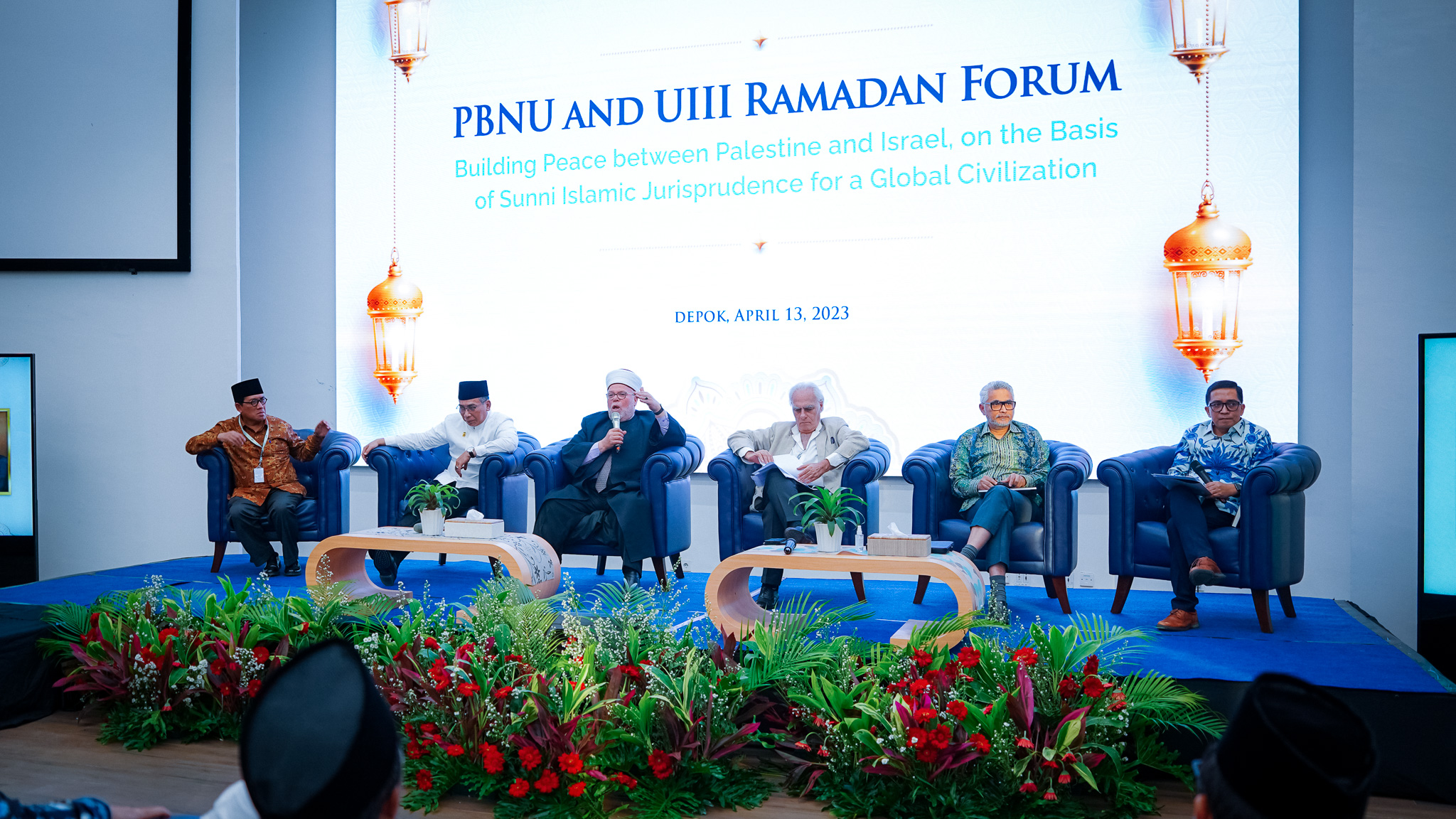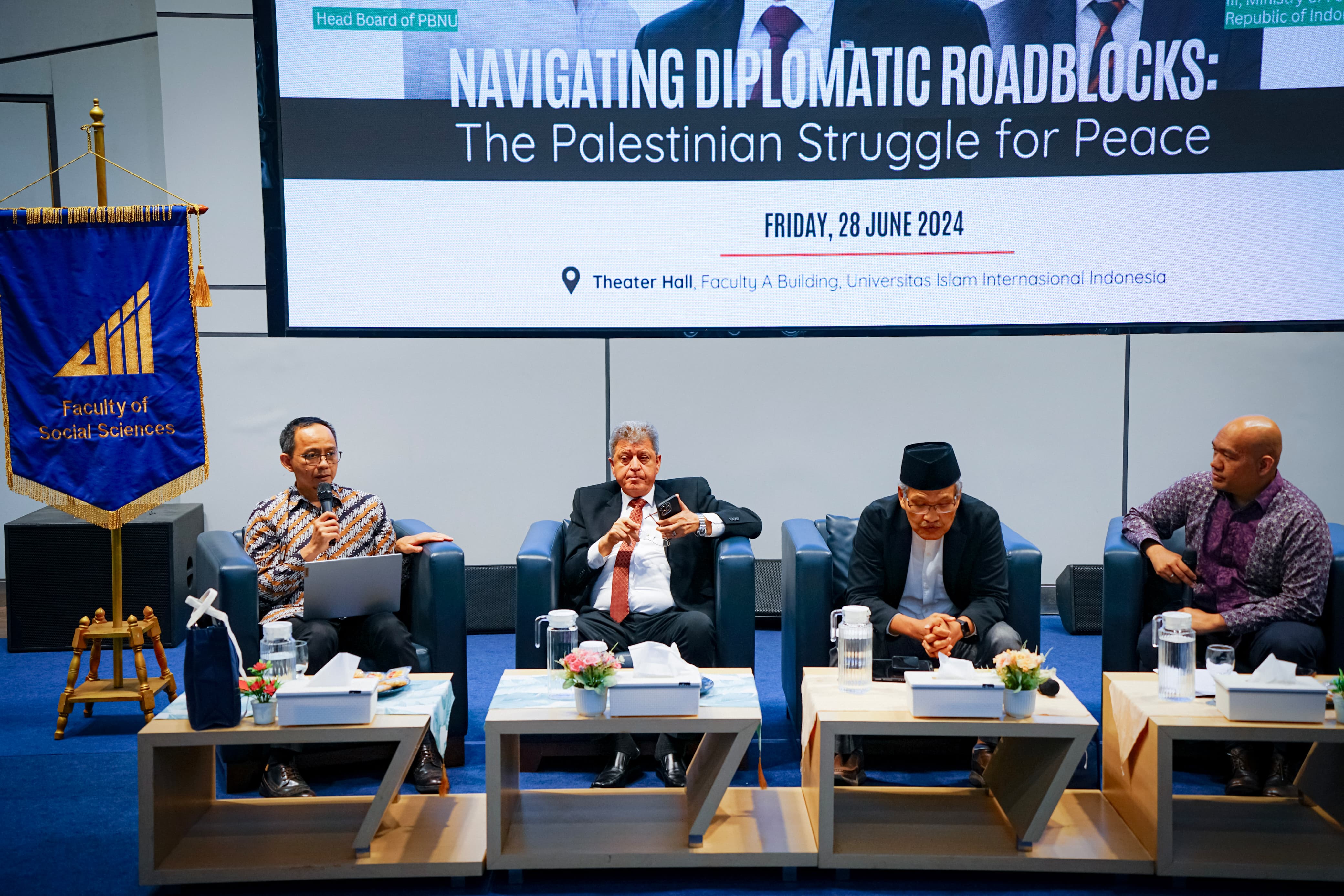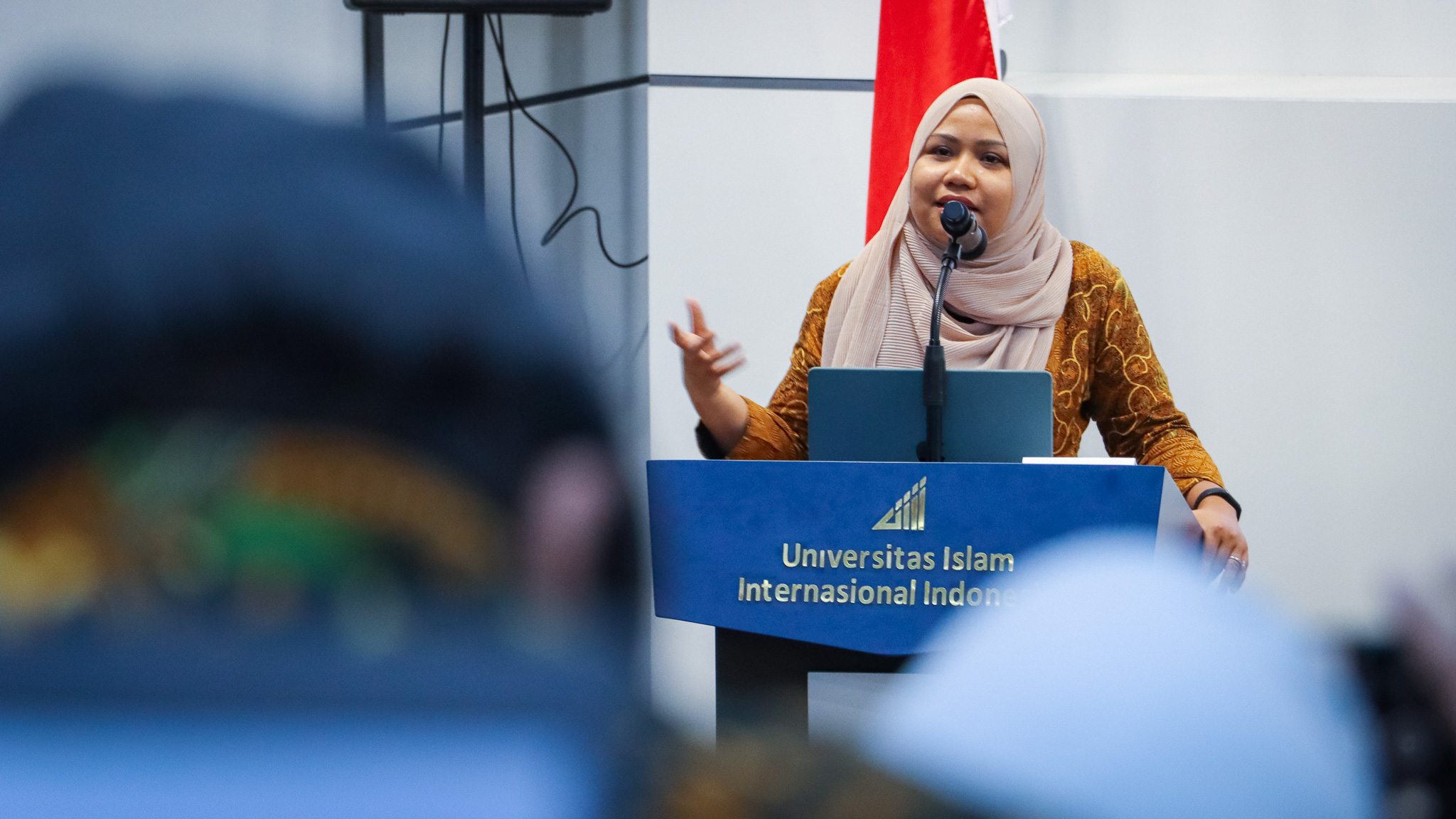PBNU and UIII Ramadan Forum: Building Peace Between Palestine and Israel, on the Basis of Sunni Islamic Jurisprudence
April 12, 2023UIII

Acting in the spirit of Ramadan, which is full of divine blessings and peace, Nahdlatul Ulama, in collaboration with Universitas Islam Internasional Indonesia (UIII), wishes to organize a forum to discuss these issues from the perspective of fiqh al-hadara ahl al-sunnah wa'l- jamaa'ah (Sunni Islamic Jurisprudence for a Global Civilization), a global initiative that is being developed and executed by the Nahdlatul Ulama Central Board on Thursday, April 13, 2023, at the UIII Depok campus.
The focus of this event consists of four objectives, firstly, to encourage the involvement of religions, and especially Islam, in an effort to foster world peace; secondly, to encourage the establishment of an independent Palestinian state that is supported by the international community, within the framework of the United Nations Charter, and whose government is committed to the principles of the Universal Declaration of Human Rights.
Third, To foster the emergence of a permanent state of peace between Palestine and Israel on the basis of mutual respect as independent nations; and finally, to prevent the spread of supremacist and violent discourse targeting either Palestinians or Israeli Jews.
To advance this worldwide endeavour, four speakers will talk at the event "PBNU and UIII Ramadan Forum: Building Peace Between Palestine and Israel based on Sunni Islamic Jurisprudence for a Global Civilization."(Fiqh al-Hadara Ahl al-Sunnah wa'l-Jamaa'ah)."
Moderator:
Philips J. Vermonte, PhD (Dean of the Faculty of Social Sciences, UIII)
Speakers:
- Mohammed Abdalhafez Yousef Azzam (Sharia Judge at the Ramallah Sharia Court, Palestinian Authority)
- K.H. Yahya Cholil Staquf (General Chairman, Nahdlatul Ulama Central Board)
- H.E. Abdul Kadir Jailani (Director General for Asia-Pacific and Africa Affairs, Ministry of Foreign Affairs of the Republic of Indonesia)
- Imam Addaruqutni (Head of the Institute for International Relations and Cooperation (LHKI), Muhammadiyah Central Board)
- James M. Dorsey (Award-winning Journalist and Scholar)
Welcoming Speech:
- Prof. Dr. Komaruddin Hidayat (UIII Rector)
- K.H. Yahya Cholil Staquf (General Chairman, Nahdlatul Ulama Central Board)
- H.E. Zuhair Al-Shun (Palestinian Ambassador to the Republic of Indonesia)
Background
What has not yet emerged decisively among either Sunni Muslims or Orthodox Jews is an authoritative religious discourse — rooted in their respective traditions of jurisprudential thought, worship, and inner spirituality — that is capable of fostering peace and harmony between Palestinians and Israelis, in conjunction with an effort to recognize and allocate to each their respective rights, as determined by the United Nations. Initial steps in this direction have, however, occurred through the 2023 Nahdlatul Ulama Centennial Proclamation and a teshuvah adopted in 2016 by the Committee on Law and Standards of the Masorti Movement’s Rabbinical Assembly, titled “The Status of Non-Jews in Jewish Law and Lore Today.”
Viewing the United Nations as a legitimate arbiter will undoubtedly be controversial among many Muslims and Jews, and especially among Islamic and ultra-Orthodox Jewish legal authorities. For neither Islamic jurists, Haredi rabbis, nor religious nationalists in Israel have generally accepted the post-World War II rules-based international order associated with the 1945 United Nations Charter and the Universal Declaration of Human Rights (UDHR), which was adopted by the UN General Assembly in 1948.
As citizens of the world’s largest Muslim-majority nation and democracy — whose 1945 Constitution mandates that the state of Indonesia “shall participate in the establishment of a world order based on freedom, perpetual peace, and social justice” — Indonesian Muslims have a special obligation to contribute to this effort and help develop a roadmap that can facilitate the achievement of peace between Israel and Palestine. We invite people of goodwill of every faith and nation to join in this endeavor.
Indonesia’s distinctive contribution includes Nahdlatul Ulama’s call for “Muslims to embrace a new vision and develop a new discourse regarding Islamic jurisprudence, which will prevent the political weaponization of identity; curtail the spread of communal hatred; promote solidarity and respect among the diverse peoples, cultures, and nations of the world; and foster the emergence of a truly just and harmonious world order, founded upon respect for the equal rights and dignity of every human being.”
As stated in the Nahdlatul Ulama Centennial Proclamation:
The Charter of the United Nations and the United Nations Organization are imperfect, and, indeed, remain problematic to the present day. However, the UN Charter was intended to end the destructive warfare and savagery that have characterized international relations throughout human history. Thus, the UN Charter and United Nations Organization may constitute the strongest available foundation upon which to develop a new fiqh for a peaceful and harmonious future for human civilization.
From the perspective of Nahdlatul Ulama’s fiqh al-hadara ahl al-sunnah wa'l-jamaa'ah (“Sunni Islamic Jurisprudence for a Global Civilization”), Palestinian Arabs, like Israeli Jews, are entitled to equal rights and protections under the law. This includes the right to self- determination.
We must acknowledge, however, the obstacles that impede the realization of this vision. Amongst these obstacles is the fact that traditional halakha forbids granting equal rights to non- Jews in the land of Israel, and that traditional fiqh, likewise, forbids the granting of equal rights to non-Muslims. Therefore, it is necessary to recontextualize certain teachings within Islam and Judaism if Muslims and Jews are ever to live peacefully and harmoniously together in Palestine, Israel, and the broader Middle East.
- UIII Hosts Workshop on Digital Content Creation with Industry Experts
- UIII and University of Melbourne Host Joint Webinar on Middle Leadership in Schools
- A Deeper Understanding of Critical Feminist Methodology
- Accelerating Smart Digitalization to Propel Growth in Islamic Banking
- A Journey Back: Madani Film Festival Shows a Life Changed by Extremism
- LunchTalk #33 on Educational Access for Indonesian Migrant Workers
- Dr. Rifqi Muna's Call for Academic Integrity to the New Student Cohort
- Dr. Syafiq Hasyim Explains the Academic System at UIII
- The Story of UIII: Guiding New Students Through Its History and Mission
- UIII Welcomes 244 Students from 28 Countries at the 2024 Convocation Ceremony


